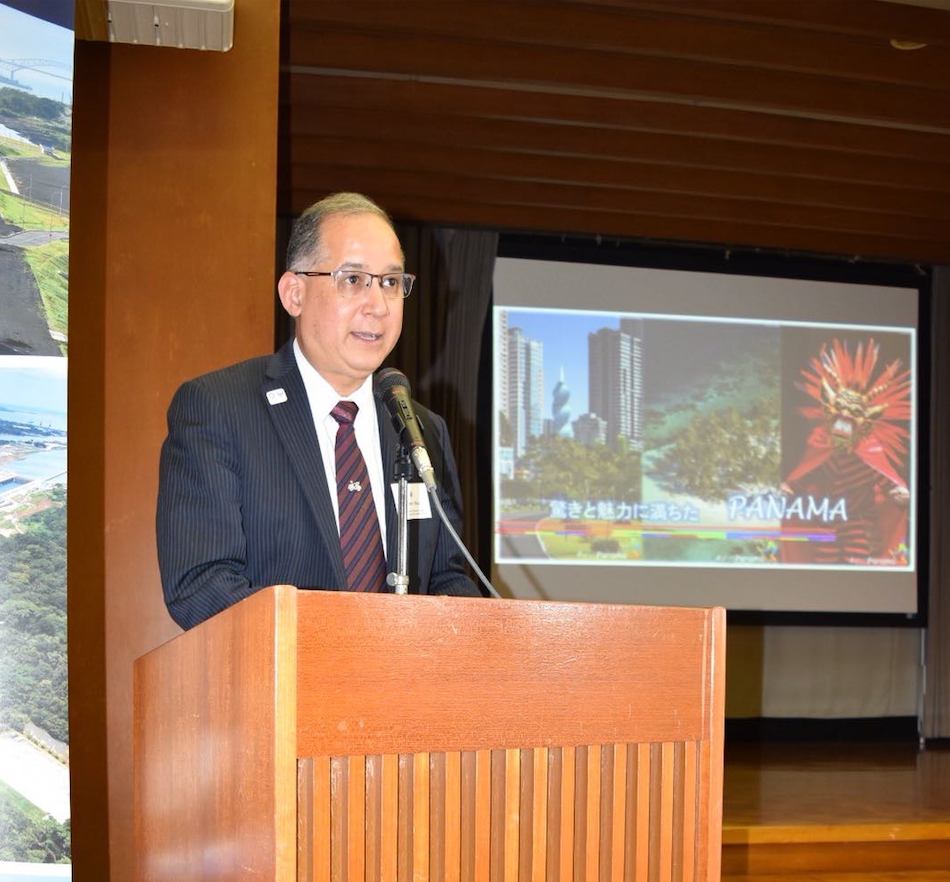Dr. RITTER NOBEL DIAZ GOMEZ
Born in 1965 in the town of Chitre, Province of Herrera, Republic of Panama. He attended elementary and high school in his native town, and, in 1984, moved to Panama City to study Law and Political Science at the University of Panama.

Based on his outstanding academic performance, he was selected in 1988 to participate in the Central American Program for Undergraduate Students (CAMPUS), under the Fulbright Program at the University of Wisconsin-Eau Claire, where he completed with honors the Bachelor’s Degree in Political Science in 1991.
After obtaining a scholarship from the Japanese government in 1996, he traveled to Japan and entered Tsukuba University as research student, focusing on local government development. In 1998, he began post-graduate studies at the same university, where he received in 2000 the master’s degree in International Political Economy, with emphasis in regional integration.
At the professional level, he worked at Banco General from 1986 to 1988 as Administrative Assistant at the General Services Department and was rehired at the same bank from 1991 to 1993, when he was promoted to Officer Assistant at the Legal and Collection Department. From 1994 to 1996, he served as Head of Credit and Collection Department of Panasonic Latin America in Panama city.
In December 1999, he was appointed Commercial Attaché of the Embassy of Panama to Japan, after completing his master’s degree at Tsukuba University, and began a long diplomatic career in Tokyo. In 2010, he was promoted to the position of Economic Counselor, and in 2014, was appointed Ambassador Extraordinary and Plenipotentiary of the Embassy of Panama to Japan and Consul General de Panama in Tokyo.
During his almost 20 years of diplomatic service, he represented Panama in different international meetings such as the Japan-Central American Cooperation and Political Dialogue, East Asia-Latin American and the Caribbean Cooperation Forum, North Pacific Tuna Commission, Meeting of State Port Control Committee, among others, which provided him a valuable experience in international negotiations as well as an extensive network of contacts.
In his capacity as Ambassador, he actively promoted the negotiation of two important agreements between Panama and Japan, namely, the Tax Information Exchange Agreement (TIEA) to prevent tax evasion and a Memorandum of Cooperation (MOC) to build and finance the construction of the Line 3 of Metro de Panama, utilizing Japanese monorail technology. So far, this MOC is a unique scheme between both countries in the area of public transport and became the largest cooperation project of Japan in the region of Latin America and the Caribbean.
As Consul, he managed to promote the first maritime dialogue between the Panama Maritime Authority and the Panama Canal Authority with the Ministry of Land, Infrastructure, Transport and Tourism of Japan with the purpose of cooperating in different maritime issues at the bilateral and international levels. This dialogue also contributed to a smooth communication between the high Panama maritime authorities and the Japanese shipping community.
At the political level, he increased the number of members of the Japan-Panama Inter-Parliamentary League from 14 to over 60, strengthening political relations between Panama and Japan, and increasing the access to the highest level of Japanese government.
As a Head of Mission, he was also able to promote academic exchange agreements between Chiba University and Panama University as well as Panama Technological University in the field of Controlled Environment Agriculture. It became the first agreement between Japanese and Panama universities, sending over 25 Panamanian students to Japan and 20 Japanese students to Panama to further expand their academic and international experience.
In his capacity as Economic Counsellor, and with experience from the private sector, he promoted the introduction of Panamanian products such as specialty coffee and rum in the Japanese market and coordinated the participation of Panamanian enterprises in several trade and tourist fairs, gaining ample experience in products promotion and event coordination. He also organized tourist seminars with major Japanese travel agencies at the official residence, which contributed to the increase from 4,000 to more than 5,000 Japanese tourists travelling to Panama.
He also demonstrated a great capacity in risk management and humanitarian assistance during the Great Earthquake, Tsunami and Nuclear Accident that hit the Tohoku region of Japan in March 2011. At that time, he played a fundamental role in the successful evacuation of more than 50 Panamanian citizens who were residing in the affected areas. He also volunteered himself to support the cleaning efforts of the city of Ishinomaki, which was seriously damaged by the quake.
In view of this outstanding academic and professional performance, he has received several awards such as the Certificate for Scholastic Achievement of the Fulbright Program (1991), the Excellence Award of the University of Wisconsin-Eau Claire (2009), the Honorary Doctorate Degree from the University of Chiba (2019), and the Grand Cordon of the Rising Sun by the government of Japan.
Currently, he serves as an independent consultant in Tokyo, advising companies how to conduct business between Japan and Latin America in the areas of export/import, tourism, financial services, real estate and governmental relations.
He is also the Representative Director of the Japan Association for the Promotion of Latin America and Caribbean (JAPOLAC).
Versión Español
Nació en 1965 en el pueblo de Chitré, Provincia de Herrera, República de Panamá. Cursó estudios primarios y secundarios en su pueblo natal y, en 1984, se trasladó a la ciudad de Panamá para estudiar Derecho y Ciencias Políticas en la Universidad de Panamá.
Por su destacado desempeño académico, fue seleccionado en 1988 para participar en el Programa Centroamericano para Estudiantes de Pregrado (CAMPUS en inglés), bajo el Programa Fulbright, en la Universidad de Wisconsin-Eau Claire, donde completó con honores la Licenciatura en Ciencias Políticas en 1991.
Tras obtener una beca del gobierno japonés en 1996, viajó a Japón e ingresó en la Universidad de Tsukuba como estudiante de investigación, centrándose en el desarrollo de los gobiernos locales. En 1998, inició estudios de postgrado en la misma universidad, donde obtuvo en 2000 el título de máster en Economía Política Internacional, con énfasis en la integración regional.
A nivel profesional, trabajó en el Banco General de 1986 a 1988 como Asistente Administrativo en el Departamento de Servicios Generales y fue recontratado en el mismo banco de 1991 a 1993, cuando fue promovido a Oficial Asistente en el Departamento Legal y de Cobros. De 1994 a 1996, se desempeñó como Jefe del Departamento de Crédito y Cobros de Panasonic Latinoamérica en la ciudad de Panamá.
En diciembre de 1999, fue nombrado Agregado Comercial de la Embajada de Panamá en Japón, tras completar su maestría en la Universidad de Tsukuba, e inició una larga carrera diplomática en Tokio. En 2010, fue promovido al cargo de Consejero Económico, y en 2014, fue nombrado Embajador Extraordinario y Plenipotenciario de la Embajada de Panamá en Japón y Cónsul General de Panamá en Tokio.
Durante sus casi 20 años de servicio diplomático, representó a Panamá en diferentes reuniones internacionales como el Diálogo Político y de Cooperación Japón-Centroamérica, el Foro de Cooperación Asia del Este-América Latina y el Caribe, la Comisión del Atún del Pacífico Norte, la Reunión del Comité Estatal de Control Rector de Puerto, entre otras, lo que le proporcionó una valiosa experiencia en negociaciones internacionales así como una amplia red de contactos.
En su calidad de Embajador, promovió activamente la negociación de dos importantes acuerdos entre Panamá y Japón, a saber, el Acuerdo de Intercambio de Información Fiscal (TIEA en inglés) para evitar la evasión fiscal y un Memorando de Cooperación (MOC) para financiar la construcción de la Línea 3 del Metro de Panamá, utilizando tecnología japonesa de monorriel. Hasta el momento, este MOC es un esquema único entre ambos países en materia de transporte público y se convirtió en el mayor proyecto de cooperación de Japón en la región de América Latina y el Caribe.
Como Cónsul, logró promover el primer diálogo marítimo entre la Autoridad Marítima de Panamá y la Autoridad del Canal de Panamá con el Ministerio de Tierra, Infraestructura, Transporte y Turismo de Japón con el propósito de cooperar en diferentes temas marítimos a nivel bilateral e internacional. Este diálogo también contribuyó a una comunicación fluida entre las altas autoridades marítimas de Panamá y la comunidad naviera japonesa.
En el plano político, incrementó el número de miembros de la Liga Interparlamentaria Japón-Panamá de 14 a más de 60, fortaleciendo las relaciones políticas entre Panamá y Japón, y aumentando el acceso al más alto nivel del gobierno japonés.
Como Jefe de Misión, también pudo promover acuerdos de intercambio académico entre la Universidad de Chiba y la Universidad de Panamá, así como la Universidad Tecnológica de Panamá en el campo de la Agricultura en Ambiente Controlado. Se convirtió en el primer acuerdo entre universidades japonesas y panameñas, enviando más de 25 estudiantes panameños a Japón y 20 estudiantes japoneses a Panamá para ampliar su experiencia académica e internacional.
En su calidad de Consejero Económico, y con la experiencia del sector privado, promovió la introducción de productos panameños como el café especial y el ron en el mercado japonés y coordinó la participación de empresas panameñas en varias ferias comerciales y turísticas, adquiriendo amplia experiencia en la promoción de productos y la coordinación de eventos. También organizó seminarios turísticos con las principales agencias de viajes japonesas en la residencia oficial, lo que contribuyó al aumento de 4.000 a más de 5.000 turistas japoneses que viajaron a Panamá.
También demostró una gran capacidad en la gestión de riesgos y asistencia humanitaria durante el Gran Terremoto, Tsunami y Accidente Nuclear que afectó a la región japonesa de Tohoku en marzo de 2011. En ese momento, jugó un papel fundamental en la exitosa evacuación de más de 50 ciudadanos panameños que residían en las zonas afectadas. Además, se ofreció como voluntario para apoyar las labores de limpieza de la ciudad de Ishinomaki, que resultó seriamente dañada por el terremoto.
En vista de este sobresaliente desempeño académico y profesional, ha recibido varios premios como el Certificado de Logro Educativo del Programa Fulbright (1991), el Premio a la Excelencia de la Universidad de Wisconsin-Eau Claire (2009), el Doctorado Honorario de la Universidad de Chiba (2019) y el Gran Cordón de la Orden del Sol Naciente por el gobierno de Japón.
Actualmente, se desempeña como consultor independiente en Tokio, asesorando a empresas sobre cómo realizar negocios entre Japón y América Latina y el Caribe en las áreas de exportación/importación, turismo, servicios financieros, bienes raíces y relaciones gubernamentales.
También es el Director Representante de la Asociación Japonesa para la Promoción de América Latina y el Caribe (JAPOLAC).
Japanese version
1965年にパナマ共和国のエレーラ州のチトレーという町で生まれた。彼は小学校と高校を故郷で通い、1984年にパナマ大学で法律と政治学を学ぶために、パナマ市に引っ越しました。
彼の優れた学力により、1988年にウィスコンシン大学オークレア校のフルブライト・プログラムの下,学部学生のための中米プログラム(CAMPUS)に参加するのに選出され、1991年に政治学の分野で名誉学士号を取得し卒業した。
1996年に日本政府から奨学金を得て、日本へと渡り筑波大学へ研究生として入学し、地方政府の発展に力を入れた。1998年に同大学で大学院生になり、2000年に地域統合を重点を置いた国際政治経済学の修士号を取得した。
専門家レベルでBanco General で1986年から1988年まで General Services Departmentで管理補佐として働き、同じ銀行にLegal and Collection Departmentで役員補佐に昇進した時、1991年から1993年に再雇用された。1994年から1996年にはCredit and Collection Department of Panasonic Latin America in Panama cityの統括マネージャーを務めた。
1999年12月に筑波大学での修士号を取得後、日本のパナマ共和国大使館の商務官に任命され、外交官としての長いキャリアが東京で始まった。2010年にはEconomic Counselorに昇進し、2014年には日本のパナマ共和国大使館と東京パナマ総領事館の特命全権大使に任命された。
彼の外交官としての約20年間、彼はパナマ共和国をあらゆる国際会議、例えば Japan-Central American Cooperation and Political Dialogue、東アジア・ラテンアメリカ協力フォーラム、北太平洋漁業委員会、ポートステートコントロール会議、などで代表してきて、それらは国際交渉や人脈の拡大をするのに貴重な体験となった。
彼は大使としてパナマ共和国と日本の間の2つの大事な協定、具体的に、脱税を防止する税務情報交換協定(TIEA)、そして日本のモノレール技術を用いたパナマメトロ3号線の建設と資金調達のための協力覚書(MOC)の2つの交渉を活発的に促進しました。今のところ、MOCは両国の公共交通機関の分野においてユニークな計画になっていて、日本とラテンアメリカ、カリブ海地域との最大級の協力プロジェクトとなっています。
領事として、彼は二国間および国際的なさまざまな海事問題に協力することを目的として、パナマ海事局とパナマ運河局および国土交通省との間の最初の海事ダイアログを促進しようとしました。このダイアログはパナマの海事当局高官と日本の海運コミュニティとの間の円滑なコミュニケーションにも役に立ちます。
政治面では、日本-パナマ両国議会連盟のメンバー数を14人から60人に増やし、パナマと日本の政治関係を強化し、日本政府高官との接触機会を増やしました。
彼は項目の担当者として、千葉大学とパナマ大学及びパナマ理工大学が環境農業分野で学術交流協定を締結することができました。それは日本とパナマ大学の間の最初の契約となり、パナマの学生25人を日本に派遣し、日本の学生20人をパナマに派遣し、学生たちの学術と国際経験をさらに高めさせました。
彼は経済顧問として、プライベート部門での経験を生かして、パナマの特産コーヒーやラム酒などを日本市場に進出させ、パナマ企業と協調して貿易と観光博覧会に参加させ、製品普及とイベント運営の経験を積みました。また、日本の大手旅行会社と官邸で観光セミナーを開催し、パナマに行く日本人観光客を4,000人から5万人に増やしました。
2011年3月に日本東北地方に襲った大地震、津波、原発事故の際にも、彼は強いリスク管理能力や人道主義的支援能力を示しました。彼は被災地に住む50人以上のパナマ国民を避難させることに成功し、地震で大きな被害を受けた石巻市の清掃&ボランティアサポートにも志願ました。
これらの優れた学術と専門的なパフォーマンスに鑑みて、彼は多くの栄誉賞を獲得しました。例えば、フラブライト計画(1991)が授与した学業成績証明書、ウィスコンシン大学優秀賞クレア賞(2009)、千葉大学名誉博士号(2019)、日本政府が授与した旭日大綬章などを受賞しました.
現在、彼は東京で独立コンサルタントを務め、企業に日本とラテンアメリカの間での輸出入、観光、金融サービス、不動産と政府関係などの分野の業務をどのように展開していくかについて相談を受けています。
それ以外、日本ラテンアメリカ・カリブ海振興協会(JAPOLAC)の理事も務めています。
